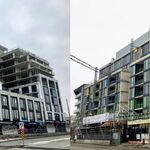Every time it seems the Canadian real estate market is about to be torpedoed by higher interest rates, events around the world conspire to keep a lid on increases and spur a new round of furious buying among house hunters.
But does that mean the housing boom will last indefinitely?
“The misfortunes of other nations prolonged the real estate boom here at home, but it is hardly a secret that Canadians, including the governor of their central bank, are becoming increasingly anxious regarding current housing valuations,†CIBC World Markets economist Bejamin Tal wrote in a note Thursday.
While the world’s economic and political situation may not settle down anytime soon, Mr. Tal said the risk to the Canadian housing market isn’t actually as high as some think. That’s because the focus is often on average prices, which make things look a lot scarier than they actually are.
“Is it a bubble? Glancing at popular metrics such as the price-to-income ratio or the price-to-rent ratio, it is tempting to conclude that the housing market is already in clear bubble territory and a huge crash is inevitable,†he wrote.
“Tempting, but probably wrong. When it comes to the Canadian real estate market at this stage of the cycle, any statement based on average numbers can be hugely misleading. The truth is buried in the details—and there the picture is still not pretty, but much less alarming.â€
While the average house price is still climbing by 8.6 per cent on a year-over-year basis, that number drops to 5.6 per cent if you exclude Vancouver. Pretend Toronto doesn’t exist either, and you get to 3.7 per cent.
Within Vancouver, the gap between average and median prices is near an all-time high – meaning the high dollar sales are skewing the average prices higher.
“So what makes Vancouver abnormal is the high end of its property market,†he said.
“So looking beyond the average price numbers reveals a highly segmented and multi-dimensional market that is probably influenced by different forces. But even a multidimensional market can overshoot—and the likelihood is that prices in the Canadian market and its sub-segments are higher than what can be explained by factors such as income growth, rent and household formation.â€
He said given those variables, the market is bound to correct. For that to happen, he said interest rates need to spike quickly and/or high-risk mortgages run into trouble.
“In Canada, a sharp and brisk tightening cycle is unlikely. The market expects a gradual increase in short-term rates in the coming years,†he said. “The rising number of mortgage holders that carry a variable rate mortgage will be the first to feel the pain, but if history is any guide, they will return quickly to the comfort of a five-year fixed rate the minute the Bank of Canada starts hiking.â€
Meanwhile, he found that the number of Canadians who could run into mortgage trouble is relative low.
“Households with both low equity positions and high debt-service ratios, we found that this fragile segment of the market accounts for only 4.6 per cent of total mortgages – a number that has been on an upward trend over the past few years,†he said.
“Shock the system with a 300-basis-points rate hike and that number would rise to a still-tempered 6.5 per cent. Historically, even in that group, the default rate has been well below 1 per cent. Thus, short of a huge macro shock, there does not appear to be the risk of large scale forced selling that would typically be the trigger for a precipitous plunge in the national average house price.â€
His conclusion? While house prices are likely to move lower as interest rates climb, the “national pace of correction is likely to be gradual. That could still entail a period in which housing underperforms other assets as an investment class, until rising incomes and a tame prce trajectory brings the market back to equilibrium.â€




